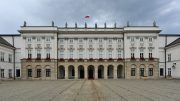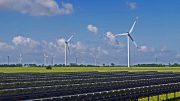For the past three years, the R&Dialogue project has been working on facilitating social acceptance for the transition to a low carbon society. Endorsed by a diverse set of stakeholders, from NGOs and oil companies to consumer groups, R&Dialogue has published ten national ‘vision papers and action plans’ setting out consensus pathways to a low carbon society. In Brussels, the policy makers are catching on fast.
It takes a village
High in the volcanic hills of central Italy lies the pretty village of Caprarola. The main local industry is hazelnut production, generating waste that is burned by farmers in the fields. A few years ago a local industrial enterprise proposed using this waste in a biomass plant, but, afraid of the pollution this might cause, the citizens of Caprarola objected and blocked the plans.
The mayor of the town, however, was concerned that their way of life could not continue without developing local sustainable energy. He sought the help of the R&Dialogue project, which facilitates collaborative discussion towards creating concrete and practical energy solutions. Funded by the European Commission’s 7th Framework programme, R&Dialogue’s 15 partners are drawn from NGOs, academia and technology consultancies in ten member states. Last year, the project began to hold meetings with the citizens of Caprarola.

Caprarola. Source: caprarola.info
‘These are meetings in which everyone is heard,’ explains Samuela Vercelli, social researcher with R&Dialogue. ‘The results were much greater than we expected. The most important result was that through this exchange we gathered a lot of knowledge about the local situation which was very different to what we understood before we arrived. Similarly, the citizens had little awareness of sustainable energy and taking advantage of the possibilities it affords them.’
Trust is essential to any collaboration, and to build it, there must be mutual respect and understanding between groups. ‘This project is about everyone being listened to,’ says Vercelli, ‘In the meetings we created a situation where everyone was equal. There was a chance for everyone to speak. Together, we began to realise that there are many possibilities that could be implemented.’
‘The citizens of Caprarola do not have to accept a traditional biomass plant – there are lots of ways to use the biomass they have available that might be more acceptable to them. We also discussed the concept of using hydrogen coupled with renewables such as solar – this might offer a way for some farms to become energy independent. We started to negotiate these problems together.’
This summer, the village held an energy festival generating an enthusiastic reaction from citizens eager to find out more. With more popular support generated by the discussions about energy, the council is now busy establishing building retrofit programmes, proposing low energy housing developments and exploring sustainable energy options for improving agricultural and manufacturing activities in the area. Through dialogue and consensus building, the local authority gained the trust of the people to deliver low carbon solutions for the village.
Energy policy makers acknowledge the ‘human factor’
From Caprarola’s town hall to European policy making circles in Brussels, the need for trust and consensus building is rising to the fore as essential to acheiving Europe’s climate and energy goals. The ‘human factor’ is increasingly recognised as a major aspect of the transition to sustainable energy, which in turn is a top level priority for European Commission president Jean-Claude Juncker who wants ‘Europe’s Energy Union to become the world number one in renewable energies’.
 Speaking recently at Horizon 2020 Energy Information Day, Paul Verhoef, head of the Renewable Energy Sources unit at the Commission’s Research and Innovation DG, referred to the necessity of social acceptance in achieving Juncker’s ambition. Verhoef said that there will be extra budget available under EU funding programme Horizon 2020 for the human factor in transforming energy systems, and that consultation with social scientists is underway on priorities for this budget.
Speaking recently at Horizon 2020 Energy Information Day, Paul Verhoef, head of the Renewable Energy Sources unit at the Commission’s Research and Innovation DG, referred to the necessity of social acceptance in achieving Juncker’s ambition. Verhoef said that there will be extra budget available under EU funding programme Horizon 2020 for the human factor in transforming energy systems, and that consultation with social scientists is underway on priorities for this budget.
According to Gert-Jan van der Panne, social scientist and project lead with R&Dialogue, ‘Dialogue with citizens and civil society on the energy transition can take different forms, including a focus on particular technologies. A positive engagement on a low-carbon technology can give us more insight in other conditions that enable support and in identifying obstacles such as lack of knowledge or trust.’
[..]
In the case of district heating, a central challenge is in getting whole neighbourhoods to surrender individual boilers and sign up for a distributed heating system. ‘This is not primarily a technological challenge. The real challenge is to organise collectively and to get people to understand the benefits of a collective system,’ says Morten Hofmeister of Danish company PlanEnergi, which is promoting district heating in six regions across Europe.
Building the consensus
Laying the foundations for such collective organising starts with conversations like those facilitated by R&Dialogue. In the Netherlands (where there is a strong tradition of consensus decision-making, known as the polder model) the R&Dialogue national ‘vision paper’ has caught the attention of policy makers.
In April, the Dutch R&Dialogue team presented their vision to the Dutch Parliament and to the Dutch Social and Economic Council steering committee which is responsible for the execution and implementation of projects linked to the country’s National Energy Agreement.

R&Dialogue team. Source: R&Dialogue
The vision paper ‘Met energie om de tafel’ presented research on the role of dialogue in policy development and in subsequent energy project implementation. The paper identifies barriers to supported decision-making, tools to improve the dialogue process and lists over 150 actions supported by more than 40 organisations. According to van Panne, ‘Politicians were eager to discuss the report in parliament, and it was published widely in the Dutch media.’
In June, representatives from the 18-person Norwegian R&Dialogue council, whose members range from representatives of the environmental NGO Spire to the energy company Statoil, met with the Minister of Climate and Environment, Tine Sundtoft, to present their vision paper on how Norway could achieve a 90 percent reduction in carbon emissions by 2050.
Minister Sundtoft responded positively to the R&Dialogue council, saying: ‘I like the approach of transformation and management of change through dialogue. There has been too much focus on confrontation and experts with lots of different opinions. It creates confusion and makes it harder to create public support for a change.’
Certainly the R&Dialogue project seems to have captured the attention of policy makers in Brussels. High level representatives from the European Commission’s DG for Climate Action, DG for Energy and the European Economic and Social Committee will all be speaking at the R&Dialogue final conference on 18 November in Brussels.
The conference also features the launch of the European Commission’s Joint Research Centre and DG Energy project for the promotion of public participation in the implementation of energy policies – the kind of participation that prompted the small Italian town of Caprarola to enthusiastically embrace sustainable energy, rather than simply object out of fear of the unknown.
Clare Taylor
Originally published by Revolve







Be the first to comment on "Winning ‘hearts and minds’ for the energy transition"